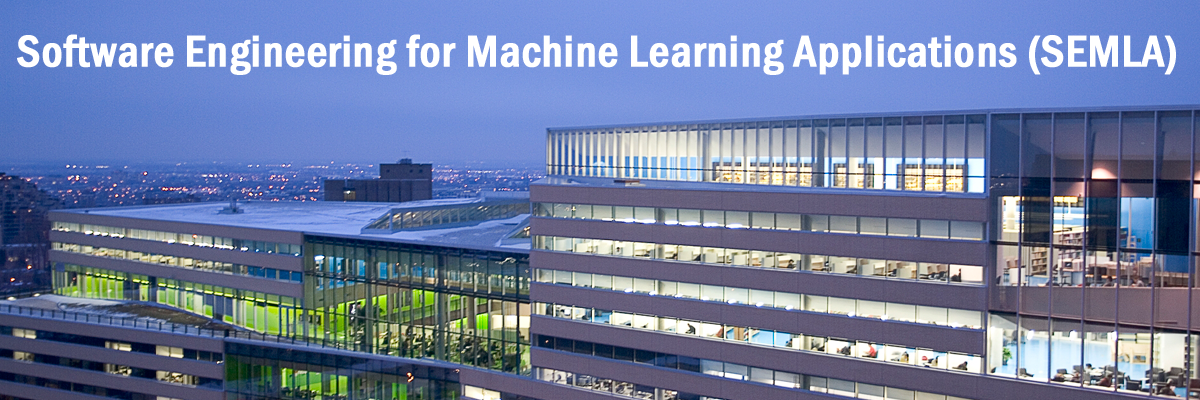SEMLA 2020 Program
Wednesday, June, 17, 2020
Speaker : Diego Oppenheimer, Founder and CEO of Algorithmia
Title: DevOps for Machine Learning and other Half-Truths: Processes and Tools for the ML Lifecycle
Date/time: June 17, 2020, 12:00pm-1:00pm EDT
Zoom link: https://zoom.us/webinar/register/WN_OqCyOJrCRm2ezAfE0w9HHA
Abstract:
Traditional software development has a Software Development Life Cycle, coalesced around a set of tools and processes. In contrast, machine learning is a tangle of tools, languages, and infrastructures, with almost no standardization. To build and deploy enterprise-ready machine learning models that generate real value, organizations need to consider a standard ML focused life cycle that supports IT’s Operations Management and Infrastructure groups.
Recording link: https://www.youtube.com/watch?v=7qUFRH6tzAY
Thursday, June, 18, 2020
Speaker : Christian Kästner, Associate professor at Carnegie Mellon University
Title: Engineering AI-Enabled Systems with Interdisciplinary Teams
Date/time: June 18, 2020, 12:00pm-1:00pm EDT
Zoom link: https://zoom.us/webinar/register/WN_i1JZYlDtSPydw9IfrDlIcQ
Abstract:
Traditional machine learning and data science education focuses on building models and evaluating model accuracy on fixed datasets. In practice though, these models are often just one (albeit important) component in a larger system that need to be designed, developed, deployed, updated, and maintained. Operating such AI-enabled system requires attention to cost, operations, system design, error handling, maintainability, and many other engineering concerns traditionally in the realm of software engineers. In this talk, I explore how data scientists and software engineers have different but complementary roles in building AI-enabled systems, how shifting to a systems perspective enables a larger view, how software engineering methods, such as system and tradeoff thinking, hazard analysis, and requirements analysis are more important than ever, and how DevOps may provide an analogy about how to think about collaborating in interdisciplinary teams and how to educate the next generation of software engineers and data scientists.
An interesting lis of MLOps ressources is available here: https://github.com/visenger/mlops-references
Recording link: https://www.youtube.com/watch?v=CHMJBlJyfZk
Monday, June 22, 2020
Speaker : Samuel Deng and Achille C. Varzi, Columbia University
Title: Methodological Blind Spots in Machine Learning Fairness: Lessons from the Philosophy of Science and Computer Science
Date/time: June 22, 2020, 12:00pm-1:00pm EDT
Zoom link: https://zoom.us/webinar/register/WN__D7I3BI3TM-sYCxdpQ4zrw
Abstract: In the ML fairness literature, there have been few investigations through the viewpoint of philosophy, a lens that encourages the critical evaluation of basic assumptions. The purpose of this paper is to use three ideas from the philosophy of science and computer science to tease out blind spots in the assumptions that underlie ML fairness: abstraction, induction, and measurement. Through this investigation, we hope to warn of these methodological blind spots and encourage further interdisciplinary investigation in fair-ML through the framework of philosophy.
Recording link: https://www.youtube.com/watch?v=S51G9fhA0K8
Tuesday, June 23, 2020
Speaker : Grady Booch, Chief Scientist for Software Engineering at IBM Research.
Title: Software Methodology and Lifecycle In AI
Date/time: June 23, 2020, 12:00pm-1:00pm EDT
Zoom link: https://zoom.us/webinar/register/WN_4Zim48zvSKiNbxuJHBh2dQ
Abstract: The problem at hand is not so much the engineering of AI components: we are in an age of exploration, discovering the landscape and experimenting with design patterns that work best with certain kinds of use cases and neural architectures. Rather, the more interesting problem is how do we best engineer software-intensive systems that have AI components? In this keynote, we’ll explore that question, and along the way, look at some emerging best practices.
Recording link: https://www.youtube.com/watch?v=8s_g2cx7xQk
Tuesday, June 30, 2020
Speaker : Mark Harman , Research Scientist at Facebook and Professor of Software Engineering at University College London
Title: The Web-Enabled Simulation (WES) research agenda
Date/time: June 30, 2020, 12:00pm-1:00pm EDT
Zoom link: https://zoom.us/webinar/register/WN_4Zim48zvSKiNbxuJHBh2dQ
Abstract:
This talk will cover the Web-Enabled Simulation (WES) research agenda, and describe FACEBOOK’s WW system. WW is used to simulate social media interactions on an infrastructure consisting of hundreds of millions of lines of code. The WES agenda draws on research from many areas of study, including Search Based Software Engineering, Machine Learning, Programming Languages, Multi Agent Systems, Graph Theory, Game AI, and AI Assisted Game Play. We conclude with a set of open problems and research challenges to motivate wider investigation.
This talk reports the results of joint work with John Ahlgren, Maria Eugenia Berezin, Kinga Bojarczuk, Elena Dulskyte, Inna Dvortsova, Johann George, Natalija Gucevska, Ralf Lämmel, Erik Meijer, Silvia Sapora, Justin Spahr-Summers.
There is a funding call (deadline 15th July) for research that underpins the WES agenda that may be of interest: https://research.fb.com/blog/2020/05/new-research-award-opportunities-in-agent-based-user-interaction-simulation/. The review process is super light-touch (2 page proposals) and the awards made to successful applicants will be in the form of unrestricted cash gifts ($30k-$50k each).


